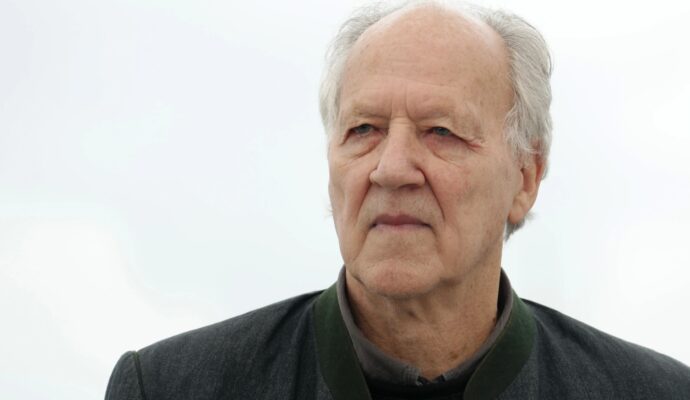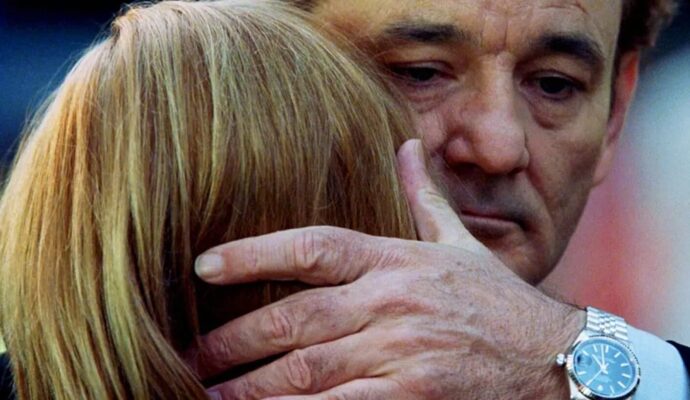On Feb. 25, 1964, Cassius Clay (Eli Goree) knocks out Sonny Liston to become the heavyweight champion at age 22. Afterward, Cassius, Malcolm X (Kingsley Ben-Adir), Jim Brown (Aldis Hodge), and Sam Cooke (Leslie Odom Jr.) get together at the Hampton House Hotel for an evening of conversation. Believe it or not, these four icons truly did meet that night, and screenwriter Kemp Powers (based on his play) imagines their discourse in a mesmerizing, intricate feature that leaves you hanging on every word. Most of director Regina King’s film transpires in a modest room, but grand viewpoints burst through the walls and off the screen as the men recognize the moment in American history and their positions in it.
Well, the four actors (Eli, Kingsley, Aldis, and Leslie), Kemp, and moderator “The Washington Post” film critic Ann Hornaday graciously hosted a Zoom call with the Art House Film Wire and other media outlets for an engaging, insightful discussion. The men spoke about playing four icons, parallels between 1964 and 2021, and much more!
“One Night in Miami” is playing in theatres and available to stream on Amazon Prime on Jan. 15.
Q: Kemp, what were the known knowns that you started with, and how did you go about using your imagination to fill in the blanks?
KP: The biggest known known for me is that this night actually happened. On Feb. 25, 1964, after Cassius Clay knocked out Sonny Liston, he did spend the night with Malcolm X, Sam Cooke, and Jim Brown, and the next morning is when he announced, for the first time to the press, that he was a member of the Nation of Islam. That’s what set it all off for me.
The Civil Rights struggle was happening for quite a while, and we were ready to get into Black Power, and I think these guys represented very different forms of that Black Power, including Sam Cooke. You think (of him as) a pop star, but if you really dig deep into his history, and his business regiment, and how he was empowering musicians and artists at the time, you realize that whole self-determination, Black Power mindset is very much in line with what Muhammad Ali and Malcolm X believed.
Knowing that, and knowing everything that happened to these men leading up to this night – and everything that was going to happen within 12 months – 1964 was a crucible year for all four men. I was trying to have this crucible moment to be something that happened during these interactions in (a believable way). I wanted to create believable characterizations.
Today, the most famous man of all is, of course, Muhammad Ali, but on that night, I saw the power dynamic as being every different, a situation where Cassius Clay at 22-years-old has three big brothers, all trying to exert influence over him. So, Cassius Clay is the little brother at 22. Jim Brown was 28 (and) his bigger brother. Malcolm and Sam, both in their 30s, are their big brothers. That’s a very, very different dynamic that calls for the characters to be positioned in a different way than your average person might naturally do it.
Q: Aldis, in a way, Jim Brown may have been the most challenging character to play because he’s so self-contained. Tell us about how you found your way into Jim Brown. He also happens to be the only one who is still with us, so I was wondering if you got to meet him.
AH: I didn’t have a chance to meet him during the process of filming and preparation. Oddly enough, I know a few people who actually have been tied to him. Also, I (dug) into my research. I see him as an entrepreneur and a businessman, so I wanted to understand his business acumen and understand his mentality. So, I started studying that, because after this particular year – 1964 – he retires and makes a transition into film and television. A few years later, he starts the Black Economic Union. When we find him in this film, he’s in that transitional space of maintaining who he is and maintaining control of his power and value. He’s been this megastar football player, but he still knows how people see him and treat him. (His attitude was), “I’m not going to ask for your permission. I’m going to do what I got to do for me, and I’m going to get out in front of it. When I get there, I’m going to bring my people with me.”
Q: Has Jim seen the film?
AH: (I had the) most nervous conversation. I was talking to (Jim’s) daughter over the holidays. \
(She said), “So my dad saw the film, (and) he thought you did a great job.”
I was like, “Whew, alright. I’m good. As long as he’s happy, I’m happy.”
How can you not be happy? I think it’s really fantastic and a wonderful celebration of these four men, their friendship, and (their contributions) to us as a people, and to a greater extent, us as a country. We all benefited from what they have given and what they have sacrificed.
Q: Leslie, I read somewhere that you, at first, were a little reluctant to play Sam Cooke. Is that true?
LOJr: That is very true. Yea, I thought there must be somebody, somewhere that was more suited. I passed on the audition. It’s embarrassing to tell this story, but it’s the truth. Every now and again, somebody sees something in you that you don’t see in yourself, and that was my experience with Regina, thank goodness.
Q: Eli, Cassius Clay is cocky and self-assured, but he’s still very young and not entirely fully-formed. How did you find your way to him?
EG: It was a long journey and a dream to play him. It’s something that I (have) wanted to do for years. I had an opportunity to audition (to play him) for another project, and I didn’t get it. So, I just continued to prepare, and I thought there would be another opportunity, and it didn’t come right away. It took about a year and a half of preparing, and I still didn’t have anything, so I thought I’d start doing a play. In preparing to do the play, the audition for this role came about, and it was one of those preparation-meets-opportunity things, and I was very blessed.
KP: (Here’s) something that doesn’t get talked about enough. (These four actors) met on-set, and in many cases, their first rehearsal was 20 minutes before they had to shoot scenes. To play friends in a way that you believe that these four guys have been friends for years – not having known each other or met each other and just showing up one day – I mean, this was an acting feat that I’ve never seen before.
We cast Kingsley about two weeks before we started shooting.
These performances really had me in awe. When you say ensemble, I think back to movies I’ve seen and loved, like “The Big Chill”. It was a dream for me, because I feel like I got to do a black “The Big Chill”.
Q: Kingsley, what was the one scene or set of dialogue that spoke to you about who Malcolm X was and, in particular, his relationship with the others?
KB-A: I was trying to ingest the language and understand what Malcolm’s place was within this story structurally. Then (I tried) my best to understand what was going on in Malcolm’s life and finding all and any information I could to give me the courage to really tap into his vulnerability. He’s such a hero (on) so many levels, and he’s this fearless, incredible human being who put his life on the line for black people. I understood quite early on – just from the brilliance of the writing – that the vulnerability of all of these men were really going to create the story arc. Without that, we would’ve been wasting our time.
(Also,) there’s something scary about (playing) these guys as well. We were constantly checking in with Regina. Are we going too far? Should we bring it back emotionally? That’s where I’m in awe of Regina and what she did in terms of really piecing together the emotional journey. She constructed the performances in a way that I couldn’t have guessed.
Q: Kemp, you had a long career in journalism. How did those experiences help shape your screenwriting success?
KP: It’s a big part of it. I’m not the first – and I won’t be the last – journalist who has transitioned into screenwriting or playwriting. I used to tell other people’s stories for a living. You interview a few thousand people, and you learn to listen to specific voices. So much of screenwriting is recreating voices and imagining voices. Novice screenwriters often have trouble. That’s why when you go to a coffee shop in Los Angeles, and everybody is sitting around and listening to other people’s conversations and writing down dialogue because they can’t imagine their own. Fortunately, I had a bit of a treasure chest of dialogue from having met people from all walks of life.
Most importantly, (it’s) the research component of it. I consider research the same as reporting. I do lots and lots of digging before I write fiction. It doesn’t matter what it’s about. It could be about dragons. My career as a journalist helped me develop a thick skin (too). Hollywood is a pretty sensitive place. We’re sensitive people, (but) I’m not that precious about things like my writing. I think it behooves me when it comes to working with people. It encourages you to collaborate a lot more and tackle things in a way that makes both people happy. In lots of ways – big and small – I think that my journalism career contributed a lot to what I do now.
JOJr.: I can attest to that, that willingness to make those small changes and collaborate. We got this brilliant roadmap from Kemp. We arrived in New Orleans, and we’re just trying to internalize those twists and turns. Less than a handful of times, but every now and again, I would have to call Kemp in L.A. and (say), “I don’t have what I need right here.”
Malcolm has been coming at me for four pages, and tomorrow, I got to respond to him, and I don’t have what I need to really come back at him. Kemp always came back with something better and richer. To make good on your training as an actor, you got to have the words. I didn’t know that as a young actor. I thought that it didn’t matter what the material was. You could dazzle them. It’s just not true. Lin-Manuel really showed me (and) a room full of people the depths of our talent and what we were capable of because of that writing. Once again, I consider myself divinely blessed and very grateful. With “One Night in Miami”, we got to come in that hotel room and were allowed to fly because of the words, because of what Kemp put down.
Q: Almost 60 years later, how are the themes and issues in this film still relevant today?
AH: Everything is relevant. (The four men) are fighting to be seen. They’re fighting to be acknowledged and respected. They’re not asking. These men from differing opinions on certain things (are) able to come together (and) figure out how to positively debate and reach the same goal in a progressive way, even when they disagree.
That’s something so needed within our community right now. For those not emotionally engaged or invested, they get to sit back and learn. There are people who think that we don’t actually feel pain or that it’s imaginary. Regardless of (the four men’s) accomplishments, regardless of what they’ve done for America, regardless of Muhammad Ali winning gold in the Olympics and bringing America a victory, you’re still a black man that we don’t care about.
So, that still goes on today, and I believe this effective piece of art allows people to understand the conversation that’s being had. This is not a conversation that has just sparked up. We’ve been having it. This is not something new.
Some people these days say, “Oh, it’s crazy what’s happening.”
No, it’s not. We grew up with this. I don’t think racism has ever dissolved. I think it’s only graduated to what people deem to be culturally appropriate. So, they can ignore it sometimes, or they can dismiss it.
They can say, “I’m not going to allow black people in the house,” and feel okay about that, but with this particular film, you get to watch what that experience is and realize it’s not okay.
Hopefully, you walk away from (the movie) with a new charge within yourself to understand and empathize a little bit more and realize there’s real work that needs to be done, that is being done, that can be done. Hopefully, you want to be a part of that work and healing the issues seldom dealt with in the right way in this country. I feel that this piece of art is a great asset to the progressive human that we need to see.
Jeff – a member of the Phoenix Critics Circle – has penned film reviews since 2008, graduated from ASU’s Walter Cronkite School of Journalism, and is a certified Rotten Tomatoes critic. Follow Jeff and the Art House Film Wire on Twitter @MitchFilmCritic and @ArtHouseFilmWre, respectively.
Image credits: Amazon Prime Video and IMDB; Trailer credits: Amazon Prime Video




